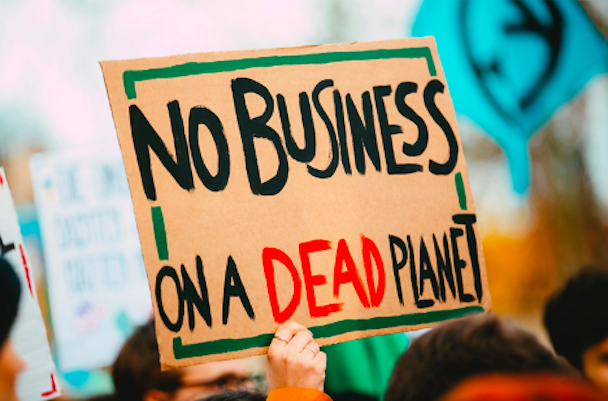‘Not now, Boomer’: adland without purpose in a transforming world keeps us all in the dark ages
Few can argue 2020 is a year so ‘unique’ that the word itself fails to do it justice.

From the devastating universal impact of Covid-19 to the biggest civil rights movement in a generation in Black Lives Matter, it’s a year that’s not only been defined by trauma but also our response to it – looking out for the vulnerable, digging deep for donations when finances are uncertain, re-educating ourselves on inequality and supporting systemic change.
And that’s before we address the climate crisis which, urgent as ever, and despite disparaging comments about Greta Thunberg from confused Baby Boomers, rages on with ferocity as we experienced the hottest April on record from the confines of lockdown.
In a world undergoing this much transformation at such a breakneck speed, we need creative, empathic and action-led thinking more than ever.
OK, but what’s all this got to do with adland? We should just stick to selling stuff, right?
Well, yes and no. While the primary function of advertising hasn't changed, the way brands operate in the world has: brands and purpose have never been more sharply in focus than in 2020 and advertising is part of a bigger ecosystem of ways we need to communicate this.
Consumer awareness
If Covid-19 has taught us anything, it’s that consumers have had their eye on exactly how brands respond when things get tough – research in the US indicates that 75% of consumers believe businesses have an ongoing responsibility to support the coronavirus relief effort, and 77% want companies to prove they’re making decisions that are in the national interest.
It’s pretty elementary to understand why consumers might feel this way: brands have platforms and influence and wealth, so it feels right that in times of need these assets should be used to Do Some Good In The World too (see Manchester United’s Marcus Rashford’s pressure campaign for free school meals that resulted in a government U-turn for a masterclass on how to do this on an individual level).
It’s not simply about the fanfare of a stunning campaign visual that elicits an emotional response - it’s about doing the doing even without one: letting actions speak louder than words. Good purpose runs deep – like Boots and Superdrug who, acknowledging the spike in domestic abuse cases during lockdown, designated their in-store chemists as Safe Spaces where people could access help.
The importance of brands and purpose pre-dates Covid-19 by some margin. The pandemic simply highlighted the need and want for brands to step up and use their clout for good – and the possibilities for this are by no means limited to the fall out of global pandemics in terms of issues to be addressed and causes supported.
This is not to say purpose is easy or always well done, it’s definitely not. Too many brands do the minimum and expect results (hello to you, token black-square-posters and annual rainbow-washers). When the approach is tokenistic, it’s understandable why some consumers might feel fatigued by it. The answer is not for brands to stop doing it, it’s simply do it better.
Those that do, see the rewards. Kantar research shows that brands with a recognised commitment to purpose in 2020 have grown at more than twice the rate of others over a 12-year period. Like Nike, who are such purpose-masters they are practically in their own lane. Sales rose 31% in days after their famous Colin Kaepernick ad was unveiled, and their approach is 360 degrees, 365 days a year, not just intermittent bold statements – so when crisis rolls around their response feels legitimate and joined-up.
Which is not to say there isn’t still work to do at Nike or anywhere else, there is always work to do everywhere.
So, should Ben & Jerry’s not express support for BLM because Unilever’s board is all-white? Of course they should, but they should also apply pressure to ensure their parent company examines its internal practices too. And one would imagine Unilever might be especially open to addressing this, knowing the value of purpose themselves, being amongst the high-achievers in terms of sustainability with their purpose brands growing over 50% faster last year.
The right targets
And while we’re on a sustainability tip, do disparaging comments regarding Greta Thunberg really feel right when according to recent reports we are on seriously borrowed time climate-wise? Instead of asking 17-year-old-girls to be quiet should we not be looking to multi-million dollar plastic producers, brands like Coca-Cola to be true to their purpose (‘Refresh the world. Make a difference.’) and make that difference by cutting their emissions? If Coca-Cola are one of the worst offenders waste-wise, imagine the impact if they flipped the dial the other way too. Truth to their purpose could literally change the world, way beyond just advertising.
It may feel like a gargantuan task alone, but there are charities literally lined up with ready-made value exchange to help brands make their purpose real. Like UN Women UK, who are launching the Everyday Allyship platform – an online portal helping women and girls access information and services post-Covid-19 – and are actively seeking brands that want to support in this space.
Ultimately, it requires work and long-term commitment. A transforming world needs world-class creatives and life-changing ideas, not regressive or reductive thinking. Brand purpose done well can and should be as memorable as the advertising that sells it.
Elles Pinfold, cultural strategist at On the One
Content by The Drum Network member:

